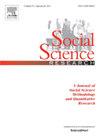Compensating or boosting genetic propensities? Gene-family socioeconomic status interactions by educational outcome selectivity
IF 3.5
2区 社会学
Q1 SOCIOLOGY
引用次数: 0
Abstract
This study investigates the extent to which the genetic propensity for education - measured using the polygenic index (PGI) for educational attainment – matters more for the final educational attainment of high or low socio-economic status (SES) students. We propose a model integrating social stratification theories, such as the compensatory and boosting advantage models, into sociogenomics, highlighting the role of educational outcome selectivity. Our model predicts that for low selective educational outcomes (e.g., high school completion), the PGI for education matters more for low-SES individuals, while for highly selective outcomes (e.g., graduate school completion), it matters more for high-SES individuals. We test our model using the National Longitudinal Study of Adolescent to Adult Health, the Health and Retirement Study, and the Wisconsin Longitudinal Study. The results corroborate our predictions and are robust to alternative models’ specifications. Our theoretical model based on the selectivity of the considered outcome explains previous heterogeneous findings and can be generalized to develop testable hypotheses for other cohorts in the US and other countries. It can also be generalized to other studies on compensatory and boosting advantage based on other traits and events and not on PGI.
补偿还是增强遗传倾向?基因-家庭-社会经济地位对教育结果选择性的影响
这项研究调查了受教育的遗传倾向在多大程度上对高社会经济地位(SES)或低社会经济地位(SES)学生的最终受教育程度有更大的影响。这种倾向是用受教育程度的多基因指数(PGI)衡量的。我们提出了一个将社会分层理论(如补偿和促进优势模型)整合到社会基因组学中的模型,突出了教育结果选择性的作用。我们的模型预测,对于低选择性的教育成果(例如,高中毕业),教育的PGI对低社会地位个体更重要,而对于高选择性的结果(例如,研究生毕业),它对高社会地位个体更重要。我们使用国家青少年到成人健康纵向研究、健康与退休研究和威斯康辛纵向研究来测试我们的模型。结果证实了我们的预测,并且对替代模型的规格具有鲁棒性。我们的理论模型基于所考虑的结果的选择性,解释了以前的异质性发现,可以推广到美国和其他国家的其他队列中开发可测试的假设。这也可以推广到其他基于其他性状和事件的补偿和促进优势的研究,而不是基于PGI。
本文章由计算机程序翻译,如有差异,请以英文原文为准。
求助全文
约1分钟内获得全文
求助全文
来源期刊

Social Science Research
SOCIOLOGY-
CiteScore
4.30
自引率
4.00%
发文量
0
审稿时长
65 days
期刊介绍:
Social Science Research publishes papers devoted to quantitative social science research and methodology. The journal features articles that illustrate the use of quantitative methods in the empirical solution of substantive problems, and emphasizes those concerned with issues or methods that cut across traditional disciplinary lines. Special attention is given to methods that have been used by only one particular social science discipline, but that may have application to a broader range of areas.
 求助内容:
求助内容: 应助结果提醒方式:
应助结果提醒方式:


